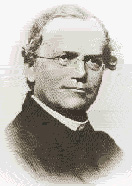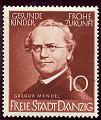|
|
|
|
||
|
Gregor Johann Mendel Botaniste autrichien Heisendorf 1822 - Brno 1884 |
||
Gregor Mendel est aujourd’hui reconnu comme le
père fondateur de la génétique.
En 1866, alors que Mendel publie l’article retraçant dix années d’expériences
d’hybridation chez les végétaux et l’adresse aux sociétés scientifiques
des quatre coins du monde, les réactions sont mitigées, voire inexistantes.
Le monde scientifique n’est pas prêt à reconnaître la qualité de ses résultats.
Ce n’est qu’en 1900 que la publication de trois nouveaux articles signés
Hugo de Vries, Carl Correns et Erich von Tschermark révèle des résultats
similaires à ceux de Mendel. Les trois scientifiques reconnaissent aussitôt
l’antériorité des travaux du moine-chercheur et le réhabilitent.
La génétique est officiellement né, près de cinquante ans après l’élaboration
des fameuses
" Lois de Mendel ".
Il est difficile de comprendre pourquoi les travaux révolutionnaire de Mendel passèrent inaperçus au moment de leur publication, mais on peut penser qu’il a manqué d’arguments de poids, comme la connaissance du support de l’hérédité - les chromosomes -, pour s’imposer face à la théorie de l’hérédité par mélange.
Presse (21.05.2005) : Les lois génétiques mendéliennes remises en question in JIM
Johann Gregor Mendel, who laid the foundation of the science of genetics, was born in Heinzendorf in former Austrian Silesia on July 22, 1822. After his graduation from secondary school, he entered the local Augustinian monastery at the age of 22. Upon completion of his religious studies in 1847, he was ordained a priest and received the name Gregor. In 1851, his abbot sent him to Vienna to study natural sciences and mathematics at the university there. Subsequently, he experimented with plants and animals, and in particular examined issues of heredity. After eight years of research, in 1868, he was able to conclude his investigations in this field successfully. Mendel defined three principles of heredity: the laws of uniformity, segregation and independent assortment. Already in 1865, he held a lecture on the results of his "Experiments with plant hybrids" at the Brünn Society for the Study of Natural Science, which was also published. Mendel's work was widely known already during his lifetime. Nevertheless, it sank into oblivion due to lack of understanding at that time. It was only in 1900 that the significance of his research findings was realised, which created the basis for rapid progress in genetics today. Mendel died at the age of 62.




